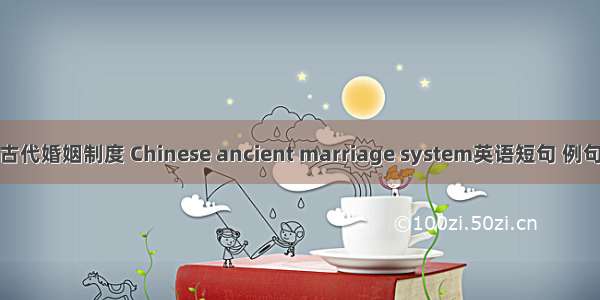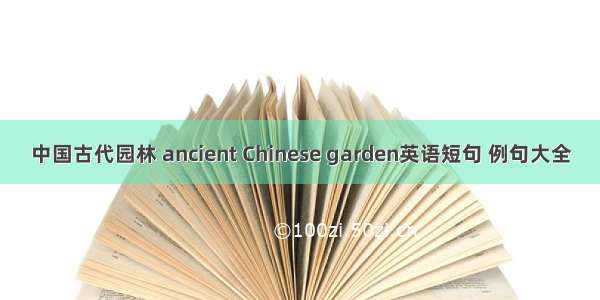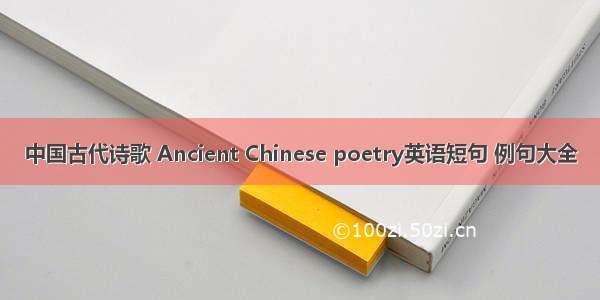
中国古代婚姻制度,Chinese ancient marriage system
1)Chinese ancient marriage system中国古代婚姻制度
1.Chinese ancient marriage system had come through the historical changes form miscegenation,communal marriage,allelomorph marriage to plural marriage of patriarchy.中国古代婚姻制度经历了杂婚制、群婚制、对偶婚制、父权制一夫多妻制的历史变迁。
英文短句/例句
1.A Textual Research on the Chinese Characters Culture Along with the Changes of Chinese Ancient Marriage System and the Relationship of Two Sexes中国古代婚姻制度及其两性关系变迁的汉字文化考察
2.A Comparative Research on Marital Concepts Between Shang-Dynastyand Ancient Foreign Countries;商代婚姻观念、制度与古代东西方各国婚姻观念、制度异同考析
3.The Features of Matrimonial Customs in Ancient China & The Chinese Mentality of Marriage;古代婚姻风俗的特点与中国人的婚姻观念
4.The Han Dynasty is a changing period for the marriage from the remote antiquity to the middle ancient times.两汉是中国古代上古婚姻向中古婚姻转化的时代。
5.Marriage became an institution in ancient societies.婚姻在古代社会就已经成为一种制度。
6.Imperative Necessity for Responsibility System in Modern Marriage;建构现代婚姻中的责任制度的迫切性
7.Marriage and the Founding of the Initial Study of the Marriage Reform婚姻法与建国初期婚姻制度改革研究
8.Reforms in Marriage System in Inner Mongolia Autonomous Region in the First Years of the People s Republic of China;建国初期内蒙古自治区婚姻制度的改革
9.On Engels Viewpoint on Marriage and the Ancient Marital Ethics in China;恩格斯的婚姻观与我国古代婚姻伦理探微
10.A Cultural Interpretation of Marriage Patterns in Ancient Chinese Poetry;品诗论史:婚姻篇——中国古代诗歌的文化解读
11.The Confucian Ethics and the Change of Olden Matrimonial Ideas of China;儒学伦理思想与中国古代婚姻观念流变之关系
12.The improvement of the system of estates by the entire of the marriage law;我国《婚姻法》中夫妻财产制度的完善
parative Research on Matchmaker System of the Qing Dynasty and Modern Marriage Intermediary System;清代媒婆制与现代婚姻中介的制度比较
14.The Influence of 《the Chinese Soviet Republic s Marital Law》 on Marriage Family System in China;中华苏维埃共和国婚姻法对我国婚姻家庭制度的影响
15.Chinese Marriage Law: between System Construction and Value Exploration--Marriage Law and Thirty Years of Reform and Opening-up中国婚姻法:制度建构与价值探究之间——婚姻法与改革开放三十年
16.Mana Va-Dharma-Sastralois de Manou and legalization of the Ancient India Marriage System;《摩奴法典》与古印度婚姻制度法律化
17.The Regulatins in Marriage of the Tang as Seen in Dunhuang MS.“Fang-qi-shu”;从敦煌《放妻书》看唐代婚姻中的和离制度
18.Superficial Analysis On Invalid Marriage And Marriage Which Can Be Cancelled Institution Of Our Country;浅析我国的无效婚姻和可撤销婚姻制度
相关短句/例句
Chinese marriage system中国婚姻制度
3)the ancient marriage system of Dong nationality侗族古代婚姻制度
1.This paper illustrates the relationship between the drum tower and the ancient marriage of Dong nationality from the following aspects: the conclusion ofthe ancient marriage system of Dong nationality and forms of the marriage and love, such as marriage with the same surnames or diffevent surnames, marriage of cousinship and so on.鼓楼是侗族文化的物质标志 ,它的产生与侗族古代婚姻制度的形成以及定 (论 )姓结亲、破姓结亲、姑表结亲等婚恋形式的出现有着紧密关系 ,通过对鼓楼与侗族婚姻制度与婚恋形式的关系的研究 ,有助于我们对鼓楼文化的深刻理解与把
4)ancient marriage古代婚姻
1.The conditions ofancient marriage accorded with feudal proprieties and were closely related with feudal ethic.中国古代婚姻的条件是封建礼法所决定的,与封建伦理道德密不可分。
5)marriage system modernization婚姻制度现代化
6)marriage system in Yuan dynasty元代婚姻制度
延伸阅读
封建婚姻制度中国封建社会婚姻关系成立与解除的制度。封建婚姻关系是建立在封建经济基础之上、男女两性间的一种社会关系,其性质和特点是由封建生产关系所决定的。违律婚 封建法律规定:①同宗共姓不准通婚。唐律规定:"诸同姓为婚者,各徒二年,缌麻以上,以奸论"(见服制)。明、清律都有同样的规定。②严禁良贱通婚。封建社会的所谓贱民名称历代并不划一,唐代主要包括部曲、客女、乐人、杂户、官户、奴婢。清代以士、农、工、商四民为良,"奴仆及倡优隶卒为贱"(《清会典·户部》)。良贱通婚为违律婚。按唐律,"诸与奴娶良人女为妻者,徒一年半。女家减一等离之,其奴自娶者亦如之。主知情者杖一百,因而上籍为婢者,流三千里。即妄以奴婢为良人,而与良人为夫妻者,徒二年,各还正之。"良贱不能通婚,是封建等级制度在婚姻关系上的反映。婚姻的缔结 主要是家长包办婚姻。《诗·齐风·南山》载:"取妻如之何?必告父母。"即必须是"父母之命"。封建婚姻的成立还要经过纳采、问名、纳吉、纳征、请期、亲迎六道程序,即所谓"六礼"。纳采是男家请媒人到女家提亲,女家同意议婚后,男家备彩礼前去求婚;问名是男家请媒人问女方的名字和出生的年月日时;纳吉是男家根据双方的出生年月日时,卜得吉兆以后,通知女家,决定缔结婚姻;纳征也叫纳币,是由男家送聘礼给女家;请期是男家择定婚期,请求女家同意;亲迎是新郎至女家迎娶。历代法典都有类似"六礼"的规定。后世缔结婚姻时,男方付给女方一定的财物作为"聘财",就渊源于"六礼"中的"纳采"和"纳征"。这实际上是买卖婚姻,即所谓"卖女纳财,买妇输绢","计较锱铢,责多还少,市井无异"(《颜氏家训·治家》)。封建法律确认聘财是婚姻成立的必要条件。唐律规定:"虽无许婚之书,但受聘财亦是。"《唐律疏议》说:"婚礼,先以聘财为信,故礼云:聘则为妻"。媵妾制 中国古代法律不准多妻,但允许纳妾。皇帝、贵族在正妻之外还娶媵,媵是随同皇后、夫人陪嫁之妾,其地位比一般的妾高,也叫"贵妾"。一般地主官僚可以蓄妾。法律上妻妾的界限极严,这是因为宗法制要求有嫡庶之分,妻所生子女为嫡出,妾所生子女为庶出,嫡子的社会政治地位高于庶子,在财产继承上优先于庶子,皇室的王位也由嫡子继承。妻、媵和妾的地位不同,在法律上的刑事责任也有差别。唐律规定:"媵犯妻者,减妾一等,妾犯媵者,加凡人一等。"封建法律为了维护宗法统治,规定妻只能有一个,而媵、妾则可以有几个,以至数十百个,所以媵妾制实际上是封建社会一夫多妻制的表现。婚姻的离异 七出 封建法律规定的丈夫休弃妻子的七种理由,又称"七去"或"七弃"。《仪礼·丧服》贾公彦疏所指"七出"就是无子、淫泆、不事舅姑、口舌、盗窃、妒忌和恶疾。《大戴礼记·本命》所指"七去":"不顺父母去,无子去,淫去,妒去,有恶疾去,多言去,窃盗去"。"七出"的内容具体反映了男尊女卑和夫权制度。封建法律为了维护封建婚姻关系的稳定性,还规定"妻无七出及义绝之状而出之者,徒一年半"(《唐律疏议》·户婚)。三不去 即妻虽有"七出"之因,但在下列三种情况下,夫亦不得休弃:"有所娶无所归(休弃时无娘家可归),不去;与更三年丧(曾为公婆守孝三年),不去;前贫贱后富贵(婚后曾与夫同甘共苦,后来夫富贵者),不去"(《大戴礼记·本命》)。唐律规定,"虽犯七出,有三不去而出之者,杖一百,追还合"。这种规定固然是从维护封建伦理道德出发,但在稳定封建婚姻关系方面也具有一定的积极作用。义绝 封建法律规定的强制离异。按唐律是指夫妻任何一方,对另一方一定范围内的亲属有殴、杀等情事,在这种情况下,必须强制离异,违者判处徒刑一年。但义绝的条件对夫妻双方并不平等。如"欲害夫者,虽会赦皆为义绝",但却无"欲害妻"的规定。妻对夫一定范围内的亲属除有殴、杀等情事为义绝外,即使仅有詈、伤等情事,亦构成义绝,而夫只在具有殴、杀等情事时才构成义绝,如仅有詈、伤等则不构成义绝。总之,建立在封建经济基础之上的婚姻制度,是从婚姻关系方面维护封建的宗法制、等级制和家长制,维护男尊女卑、夫权制度和封建伦常关系,以巩固封建统治秩序。
















